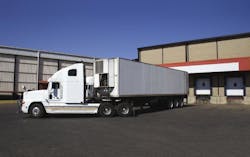Is confidence on the rise regarding new food transport rules?
There’s been a lot of debate over the past few months about how new food transportation safety rules might impact both shippers and trucking firms (you can click here and here for other stories on that subject)
Yet if a recent survey conducted by enterprise software provider Sparta Systems, Inc., is any guide, a majority (61%) of U.S. food and beverage professionals feel “confident” their organizations are “prepared to meet” the strict requirements of the new Food Safety and Modernization Act (FSMA) promulgated by the U.S. Food & Drug Administration (FDA).
That act aims to shift the focus of the FDA from “responding” to contamination of the food supply to “preventing” it—and nearly half (43%) of the 150 food and beverage professionals Sparta polled (I know, that ain’t a lot, is it?) think those regulations will indeed ultimately increase visibility and safety throughout the supply chain.
Folks working at big food companies also think they’ll be able to comply with the FSMA's Foreign Supplier Verification Program (FSVP), which requires importers to perform risk-based tests to verify that foreign-manufactured food or food ingredients are as safe as those produced in the U.S.
Yet the outlook isn’t coming up all roses – especially where technological needs are concerned.
One of the tenets of these new rules is that shippers need to be able to confirm – with evidence – that transportation providers are following “approved” food shipment protocols: washing out tankers and trailers at approved locations, for example, and providing temperature reporting for foodstuffs in transit.
According to Sparta’s poll, more than a third (38%) of the respondents said their organizations still manually track, manage, and report food quality and safety, while 56% of them said such processes are only “partially automated.”By contrast, just a measly 7% said they are using fully automated systems – and that could be a big problem where the new food safety rules are concerned, Brian Belcher, vice president of business development at software firm LoadDocs told me by phone.
“Compliance with the new rules is being placed directly on the shippers, but it does not provide exact wording as to how that’s to be done,” he explained. “Capturing documentation is ultimately about how to present compliance data to shippers.”
Brandon Henning, Sparta’s director of industry solutions, stressed in the survey that such issues are only going to get “tougher and tougher” to deal with in the months ahead.
"After FSMA was enacted in January 2011, and raised the industry standard for food safety, F&B companies saw a 41% increase in warning letters issued by the FDA as a result," he said.
"FSMA regulations only stand to get tougher and more complex, which could prove particularly challenging for those managing compliance through manual or hybrid systems,” Henning added. “It is critical now for organizations to adopt methods … that will ensure visibility into the food quality and safety processes of all suppliers and contract manufacturers."
A few more findings from Sparta’s survey worthy of note by trucking companies:
- Nearly 20% of respondents to Sparta’s poll working at medium-sized companies disagreed that their organizations were ready or had a clear strategy to be compliant with FSMA.
- An overwhelming majority (93%) of respondents with job functions related to quality assurance agreed that supplier visibility is important to their organizations.
- More than half of respondents (60%) believe "improved supply chain visibility" would help improve food quality and safety.
- Additionally, 37% believe automation of quality and safety processes would yield a positive impact.
If anything, those responses indicate there is plenty of opportunity for motor carriers to step into the “data gap” so to speak and provide shippers with FSMA compliance solutions. We’ll have to wait and see if such “opportunity” truly pans out for truckers.

